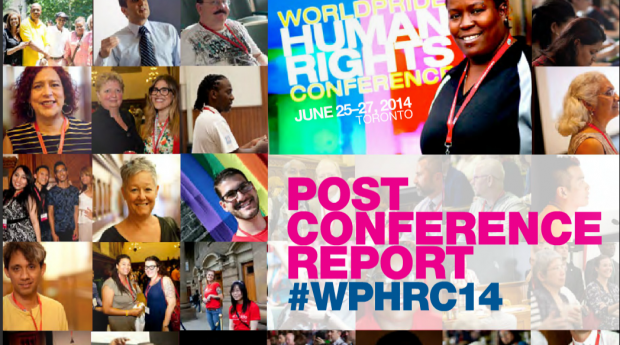More than 20 Canadian civil society organizations have penned a call to action to the federal government, outlining how to improve the lives of LGBT people around the world.
The report was released during the LGBT issues debate at Toronto’s Buddies in Bad Times Theatre on Sept 24, 2015, hosted by the Dignity Initiative.
“Dignity Initiative is a collaborative project that grew out of WorldPride last year,” says project lead Doug Kerr. “One of the things that came up again and again at the conference was, ‘What should Canada do related to foreign policy issues, related to refugee issues?’”
Canada needs a national conversation about how Canadians and their government could better support global struggles for human rights for LGBT people, Kerr says. The policy paper’s authors include a working group of more than 30 people and organizations, and the paper has been endorsed to date by an additional 124 civil society groups.
The recommendations range across international categories, including outreach to international activists and providing better support for LGBT refugees in Canada. According to the report, Canadian development assistance should not go to “organizations that promote or support legislation criminalizing LGBTI people or that encourage hatred or violence against LGBTI people.”
During the debate, candidates representing the Green, Liberal and NDP parties all said the practice needs to stop, and were keen to hear the recommendations made in the report.
“They were all quite enthusiastic about it,” Kerr says. “We still have to officially give it to each of the parties. We’ll be doing that in the coming weeks.”
Craig Scott, NDP MP for Toronto-Danforth, said his party is committed to implementing all of the reports recommendations if it forms the next government.
“I would say it’s a program that the NDP can fully support,” Scott said, adding that it would be accomplished by reorienting existing budgets within the Department of Foreign Affairs and Development.
Under the current government, emphasis has been aiding Canadian business without much emphasis on human rights, Scott said. “Money is being spent on beefing in almost a propagandistic way the transnational corporate sector. I can’t imagine that we would be devoting the same kind of diplomatic energy and money to that as to this kind of LGBTQ model that also is a well drawn model for broader human rights engagement.”
During the debate, all three candidates emphasized how they would reorient Canada’s international development goals back to human rights, funding and consulting with organizations on the ground.
Liberal candidate Bill Morneau, who is running in Toronto Centre, said Canada must devote more attention to human rights, including LGBT issues. But he stopped short at saying exactly how the Liberals would carry that out.
“The next Liberal government will closely consider all of the recommendations presented by the Dignity Initiative as we move forward in advancing the cause of LGBTQ rights,” he said.
Morneau said he understands the experience of refugees through his personal work, outlining how he participated in building a technology centre in a refugee camp, and how he and his wife sponsored a young woman from Uganda who still lives with them today. More recently, as the executive chair of the human resources firm Morneau Shepell, Morneau and his colleagues built a boarding school for South Sudanese and Somali girls living in a refugee camp in Uganda.
“I am personally engaged with this and I hope to be an advocate for it in Ottawa,” he said.
The Conservative Party was invited to send a representative to the debate, but the chair on stage reserved for that person remained empty. Daily Xtra reached out to self-identified gay Conservative candidate for Toronto Centre Julian Di Battista for comment, but did not receive a response. To date, Dignity Initiative organizers have not received a response from the Conservative Party regarding the LGBT issues debate or the recommendations.
While the three parties represented at the debate were generally positive about the policy recommendations, some activists wish it went further.
“Right off the bat acknowledging two-spirit and the limitations of LGBTQI to capture that, how about LGBTQI2S?” says Jeffrey McNeil-Seymour, two-spirit Secwépemc scholar from Kamloops, BC.
The call to action does begin with a section titled “Addressing Human Rights Here at Home” that outlines how trans people in Canada still do not have explicit protection against discrimination, the need for better help for LGBT youth and that indigenous women face radicalized violence from the police.
But McNeil-Seymour says the document should acknowledge that Canada itself spans the international territory of many First Nations — many LGBT organizations have failed to engage Aboriginal communities in a meaningful way so far in Canada.
“The issues of First Nations people are not just a box to be checked off and acknowledged so you can move on,” he adds. “Of course this work is so important but we have multiple silos of oppression to engage with both abroad and at home.”
But while there is a need for more work, there is also praise for the Dignity Initiative’s efforts at consulting with the people it aims to support.
The WorldPride Human Rights Conference was a chance for global activists to come together. It allowed organizers to meet the people on the ground fighting for LGBT rights internationally.
“I think it’s a good start and it’s time Canada steps up,” says Val Kalends, a Ugandan LGBT activist whose refugee claim to Canada was recently accepted. “Countries like Sweden and Denmark and the United States know how to deal with global LGBT rights.”
The current report will be delivered formally to each major political party in the coming weeks, with two more papers to come later in the year: first, a paper that compares Canada’s record with other western countries on LGBT rights; and then a final look at best practices in Canada by community or educational groups supporting LGBT rights.

 Why you can trust Xtra
Why you can trust Xtra


